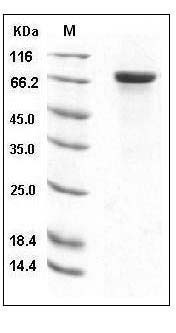-
Product Name
Human HPRG/HRGP (His Tag) recombinant protein
- Documents
-
Description
Plasma glycoprotein that binds a number of ligands such as heme, heparin, heparan sulfate, thrombospondin, plasminogen, and divalent metal ions. Binds heparin and heparin/glycosaminoglycans in a zinc-dependent manner. Binds heparan sulfate on the surface of liver, lung, kidney and heart endothelial cells. Binds to N-sulfated polysaccharide chains on the surface of liver endothelial cells. Inhibits rosette formation. Acts as an adapter protein and is implicated in regulating many processes such as immune complex and pathogen clearance, cell chemotaxis, cell adhesion, angiogenesis, coagulation and fibrinolysis. Mediates clearance of necrotic cells through enhancing the phagocytosis of necrotic cells in a heparan sulfate-dependent pathway. This process can be regulated by the presence of certain HRG ligands such as heparin and zinc ions. Binds to IgG subclasses of immunoglobins containing kappa and lambda light chains with different affinities regulating their clearance and inhibiting the formation of insoluble immune complexes. Tethers plasminogen to the cell surface. Binds T-cells and alters the cell morphology. Modulates angiogenesis by blocking the CD6-mediated antiangiongenic effect of thrombospondins, THBS1 and THBS2. Acts as a regulator of the vascular endothelial growth factor (VEGF) signaling pathway; inhibits endothelial cell motility by reducing VEGF-induced complex formation between PXN/paxillin and ILK/integrin-linked protein kinase and by promoting inhibition of VEGF-induced tyrosine phosphorylation of focal adhesion kinases and alpha-actinins in endothelial cells. Also plays a role in the regulation of tumor angiogenesis and tumor immune surveillance. Normalizes tumor vessels and promotes antitumor immunity by polarizing tumor-associated macrophages, leading to decreased tumor growth and metastasis.
-
Protein name
Histidine-rich glycoprotein
-
Protein short names
THPH11; D16JH2; HRGP; HPRG; AI265597; DKFZP779H1622; AW413091; D18020; HRG
-
Uniprot ID
P04196
-
Gene Name
HRG
-
Source/Expression Host
Human Cells
-
Expression Plasmid/cDNA
A DNA sequence encoding the human HPRG (NP_000403.1) (Met 1-Lys 525) with a C-terminal polyhistidine tag was expressed.
-
Protein Species
Human
-
Molecular weight
The secreted recombinant human HPRG comprises 518 amino acids with a predicted molecular mass of 59 kDa. As a result of glycosylation, rhHPRG migrates as an approximately 75-80 kDa band in SDS-PAGE under reducing conditions.
-
Purity
> 97 % as determined by SDS-PAGE
-
Activity
Measured by its ability to support the adhesion of MOLT-4 human acute lymphoblastic leukemia cells. (Lamb-Wharton, R.J. and W.T. Morgen, 1993, Cell Immunol. 152: 544). Human HPRG immobilized at 1 μg/ml (100 μl/well) will induce >65% MOLT4 cell adhesion (1 x 10E5 cells/well) in the presence of 7.5 μg/ml Concanvalin A.
-
Validations

Human HPRG / HRG Protein (His Tag) SDS-PAGE
Related Products / Services
Please note: All products are "FOR RESEARCH USE ONLY AND ARE NOT INTENDED FOR DIAGNOSTIC OR THERAPEUTIC USE"
